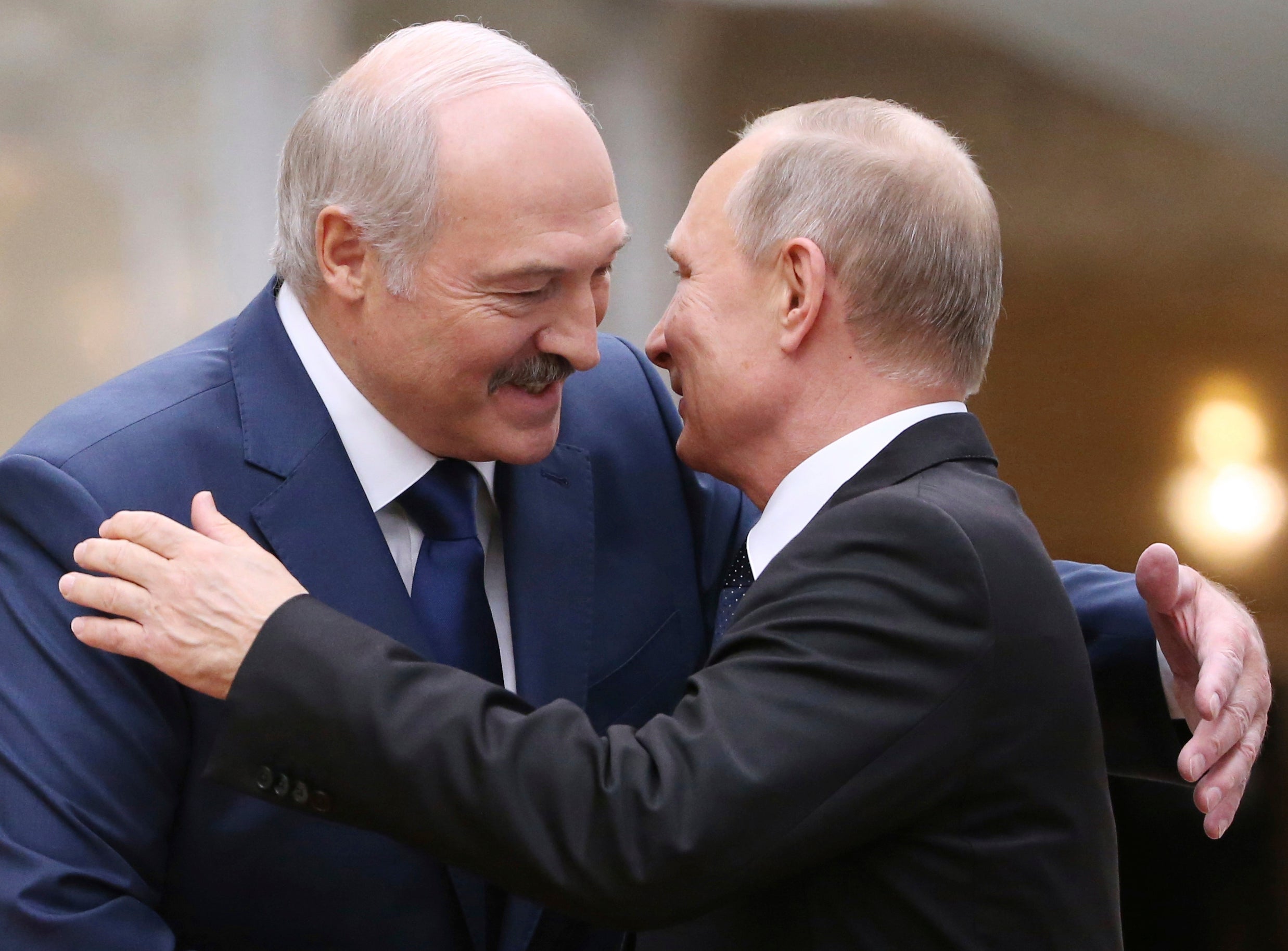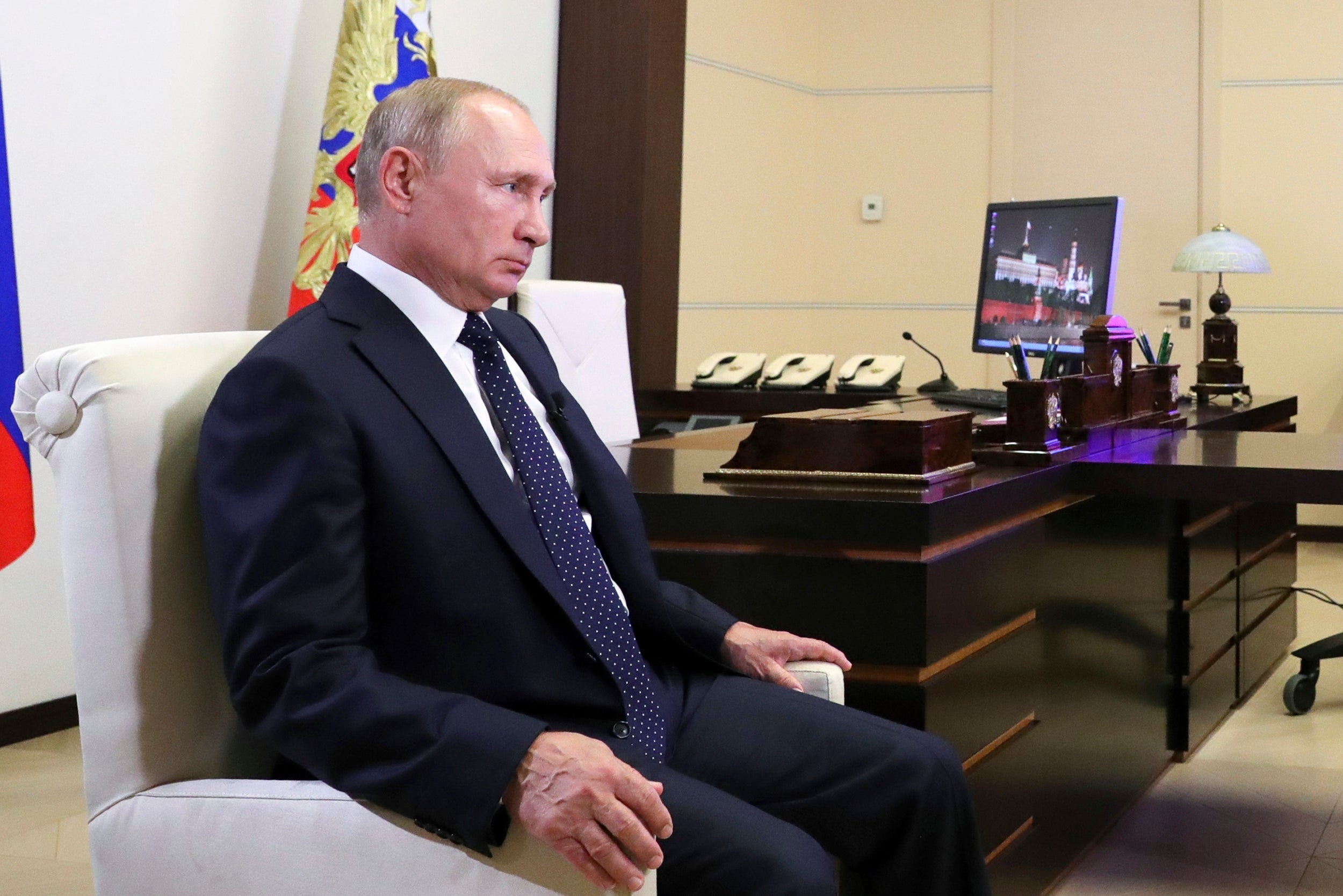Belarus: Putin to create police ‘reserve’ for embattled Lukashenko – but can we really expect Russian troops in Minsk?
Russia’s president is known for showing his teeth but a military intervention would appear to go against the wishes of the majority in both countries, as Oliver Carroll reports from Minsk


Vladimir Putin set out a clear path to Russian military action in Belarus for the first time on Thursday, announcing that he had agreed to assemble a “law enforcement reserve” at the request of the country’s embattled autocrat Alexander Lukashenko.
Such forces, used only if the situation went “out of control”, would be provided under the terms of a joint security treaty, Mr Putin said.
The carefully choreographed comments – delivered in a 20-minute interview on Russian state television – will provide a huge comfort to Mr Lukashenko and his allies. They will also have alarmed the overwhelming majority of Belarusians who have for the last three weeks bravely protested the violent excesses that followed a blatantly stolen election.
Mr Putin’s comments themselves are not enough to predict a Russian intervention – at least not yet. The fundamentals in Belarus remain unchanged. That is to say, there are still no easy solutions for the Kremlin.
Military intervention in a country that clearly doesn’t want it carries all sorts of risks. Intervention against the peaceful women, miners, and workers who are leading the protests and strikes seems doubly outlandish. Intervention would turn a protest without a clear geopolitical dimension into one led by it. Intervention would also put Russian servicemen up against perhaps 80 or 90 per cent of the population.
Belarus is hugely important to Russia, a fact that was underlined by Mr Putin during Thursday’s interview, in which he described the country as the “closest” Russia had to call on. “Ethnically, linguistically, culturally, in faith, in whatever, we are the closest,” he said.
But Belarus is not Crimea, the last major inter-Slavic conflict Mr Putin had to justify to his people. “Crimea has always been an integral part of Russia in the hearts and minds of people,” he said in 2014. Belarus clearly does not fall into the same category.
The Russian public is also largely sympathetic to the protests. Footage of the Gestapo-type policing and torture that Mr Lukashenko inflicted on his population was shown on Russian state television. The Kremlin would have to do some serious ideological work to bring them round.
For sure, Mr Putin’s comments do push Moscow into a new rhetorical zone, and offer Belarus's 26-year ruler some guarantees against a bloody overthrow. They are an explicit signal the Kremlin will intervene if the situation turns violent – “if extremist elements [...] cross red lines, [...] engage in rioting, burning cars, homes, banks, or try to seize government buildings”.
So far the Belarusian revolution has been anything but violent. A symbol of the protests has been the spotless squares and teams picking up rubbish after everyone has left. Of course, it only takes moments of increased frustration, or a well-planned provocation to change all of that. Mr Lukashenko is now explicitly interested in that violent turn. Perhaps Mr Putin’s men, past masters at such dark arts, will offer a hand. In Crimea they saw the work of “fascists”; in Donbass, they said children were being crucified. Both were obvious falsehoods.

We do know Russia’s leader has an emotional reflex to the idea of colour revolutions, and the idea of the power of the street forcing a regime from power. His views on the fall of the Soviet Union are no secret – “the greatest geopolitical catastrophe of the century” – as is his terror in front of the mob, witnessed in his final days as KGB resident in Dresden.
Mr Putin is clearly hoping Mr Lukashenko will eventually take control of the situation. But that isn’t the same thing as saying he has decided what to do if he doesn’t. When it comes to that point – and we are still some way away from that – Russia’s security top table will need to ask whether saving a weakened dictator is worth being subjected to the anger of a previously sympathetic population.
Drilling down, Thursday’s comments included several get-out clauses – “we agreed there is no need to provide the troops now”, “there are problems that need to be resolved legally and peacefully”, "listen to the problems," and so on. On balance, they seemed more geared towards raising the price of serious protest, and perhaps sapping the morale of protesters, than offering explicit threats to send in Russian tanks.
It is, of course, impossible to be categorical in such moments. The Russian president does have a reputation for belligerence. This is a historical opportunity to reverse part of his “geopolitical catastrophe”. But Mr Putin also has a reputation for surprising people by doing the thing least expected of him.
Join our commenting forum
Join thought-provoking conversations, follow other Independent readers and see their replies
Comments